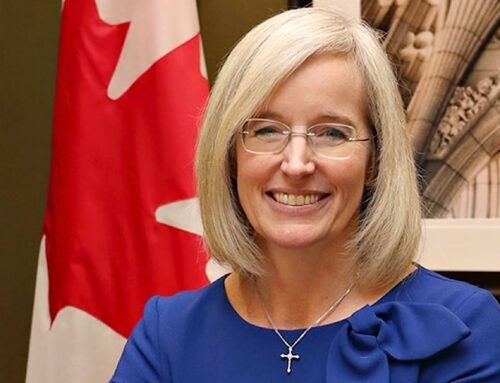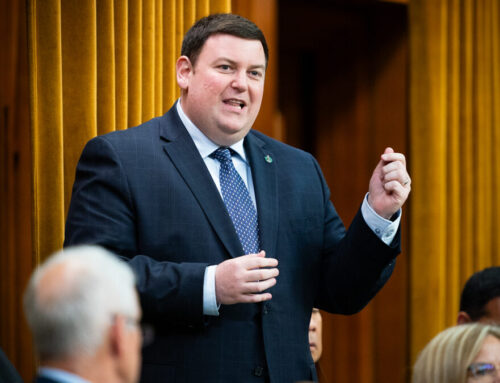Parents must relinquish power as new guidelines mold Ontario’s children into little New Democrats
Parents in Ontario are bracing for major changes in their schools over the next three years with the release of the Common Curriculum, an “outcomes-based” strategy for teaching students.
It doesn’t matter whether the school is public, separate, private or at home, the document handed down by the Ontario Ministry of Education earlier this year will shape the lives of all Ontario students up to Grade Nine into the next century. Most parents don’t even know these changes are happening in their schools. Until now they’ve been in the dark and so they are just starting to question what many say is another unwanted intrusion by the government into the classrooms of the province.
The teachers’ version of the Common Curriculum came to the attention of The Interim through an irate teacher who says she has lost all patience with the latest trend to politicize education. The document itself declares it is intended to replace the old philosophy of setting objectives for students and teachers. It represents the so-called child-centered approach to education and is intended to address the diverse nature of the school system. It is “holistic in its view of an increasingly complex and interdependent world.” Its emphasis is on “connections and relationships – relationships among ideas, among people, and among phenomena.”
The Ontario teacher, who wished not to be identified, says the new curriculum is an example of the “strong political agenda in education. This is a social document, not an educational one,” she says. “It wants everybody to be exactly the same. They think this is going to create some kind of utopia.” As an inevitable result of the policies in the document, “parents have to relinquish power.”
This teacher sees the document as positive when it sticks to subjects like math or reading or writing. It becomes dangerous, she believes, when it starts dealing with values, especially those it considers common to all students and schools.
The curriculum is divided into four core programme areas. They are: Language, the Arts, Self and Society, and Mathematics, Science, and Technology. Each area has specific targets (referred to as outcomes) which the student is expected to achieve. The Self and Society section raises the greatest concern among parents and educators.
Like most documents written by bureaucrats and politicians, the offensive parts are not easy to pinpoint and some of the language is deceptive. But according to Hugh Loughran, a former teacher with a public school in the Peel Board, the danger of the curriculum lies in the fact that the government and schools are superseding the family.
“They are saying parents don’t know how to raise children,” he says, “Having made it impossible for the family to do its job, they say we are going to do it for you. The children are the property of the state and the state is ultimately responsible.”
He says schools are becoming less an extension of the home and the beliefs of the family. The document, he contends, drives a wedge between the students’ own and their families’ beliefs. This all happens at an early stage, before the children have even reached high school.
An example of this attitude in the document is found in the General Learning Outcomes of the curriculum. It says students will: “be able to use relevant information to make responsible personal choices about health, lifestyle, and relationships…” These personal choices among the students would start in Grade l and there is no reference to the values or morality which their parents and families might have as a guide to their choices.
In the Principles Underlying Education for Grades 1 to 9, the document states that “(s)chools cannot be value-neutral.” It says the values which underlie the curriculum are those of the majority of Canadians. The document continues:
“These values transcend cultures and faiths, reinforce democratic rights and responsibilities, and are based on a fundamental belief in the worth of all persons and a recognition of the interdependence of all human beings and the environment.”
Loughran says the curriculum claims to have values but in reality “there are no values here. This whole document is a melting pot. Everyone comes out a bland mass.”
Values are not something the document says are handed down or presented to students. Rather the document states “effective learning involves actively constructing the meaning in one’s world.”
Winifride Prestwich, a former vice-principal of a prestigious Toronto girls private school, agrees that values suffer if schools try to cater to all. “I think students are going to be homogenized,” she says.
She goes as far as calling the Common Curriculum a “disaster.” “Apparently this curriculum was drawn up by a committee,” she says. She says the document goes on for pages about the students’ self-evaluation, aspirations, roles in society and relationships with other groups. Then it says students will “know about the history of Canada.”
“What a task,” says Prestwich. “Given that history is one seventh of one quarter of the curriculum, the statement is absurd.” She goes on to call the curriculum “a prescription for the down-grading of elementary education in Ontario.”
Jane Evans, head of the Ottawa chapter of Citizens United for Responsible Education (CURE), says the news about the Common Curriculum is not all bad. She sees the fact the document acknowledges education is not value free as an “amazing statement. To me it’s a positive thing and I think we can use it.”
She says, however, for the document to work it is necessary for concerned parents to mobilize and get involved in shaping the values which underlie it. This will happen through the school boards and the trustees as they interpret the document for their own jurisdictions.
Loughran says he knows, from experience that there is a lot of apathy among parents. He says it is difficult to mobilize them even on such an important issue like the education of their children. He says there have to be letters from parents to school trustees informing them of concerns around the Common Curriculum.
“There has to be a consistent multi-faceted attack,” he says.
David Cooke, provincial Minister of Education and Training, has said the document will be implemented throughout Ontario starting September of 1993 and the process will last for three years. The Common Curriculum is being promoted as a working paper and theoretically is open to parents’ concerns and recommendations.
“I want it to be the basis of an ongoing process of collaborative curriculum development involving my ministry, educators, parents, and the wider public,” he said in a newsletter announcing the new curriculum.
Parents can voice their concerns to their own school trustees and to the Common Curriculum, Ministry of Education and Training, Mowat Block, 16th floor, 900 Bay Street, Toronto. M7
A 1L2.




